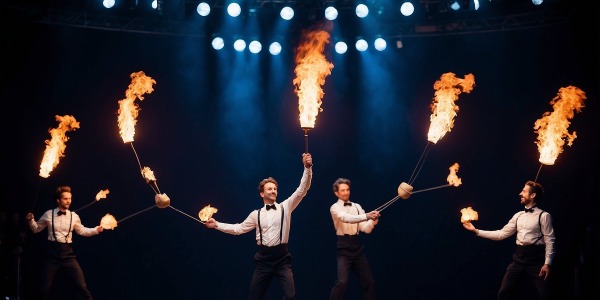The 12 Funniest Misunderstandings Due to Language Barriers That Will Leave You in Stitches
Language barriers can lead to some of the funniest misunderstandings. Whether you’re traveling abroad or chatting with someone from a different culture, miscommunications can happen in the most unexpected and hilarious ways.

How do these language mix-ups occur, and what makes them so amusing? From mispronounced words to mistranslated signs, these misunderstandings often reveal the quirks of different languages and the creativity needed to overcome them. Get ready to laugh as you explore the 12 funniest moments when language barriers led to unforgettable mistakes.
1. Ordering ‘brain cake’ instead of ‘carrot cake’ in a bakery in Japan

Imagine you’re in a bakery in Japan. You’re looking forward to a slice of carrot cake. You try your best to say it in Japanese. Instead, you ask for “brain cake”.
The cashier looks puzzled and maybe even a bit worried. You repeat your request, thinking you’ve said it correctly. You’re persistent and confident.
In reality, you’ve mixed up words. “Ninjin” means carrot, but you said “nozomi”. The latter translates to “brain”. You didn’t notice the shocked reactions around you.
Eventually, a kind passerby helps clarify. Amid laughter, you finally get your carrot cake. It’s a memorable experience!
2. Asking for a ’nude’ when needing a ’notary’ in Italy

Imagine you’re in Italy and need important documents notarized. You ask around, trying to find a “notary public.” Your Italian might not be perfect, but you give it a shot.
Instead of saying “notario,” you say “nudo,” which means “nude.”
The person you’re talking to looks shocked!
They may laugh or give you a confused look. They think you’re asking for something completely different. It’s an innocent mistake, but it can lead to a lot of giggles or raised eyebrows. You quickly realize what happened and try to correct yourself.
This is a common mix-up for tourists in Italy. It’s a funny story you’ll probably tell for years. Making language mistakes is part of the fun of traveling.
3. Requesting a ‘Bed’ Instead of ‘Beer’ in a German Pub

Imagine you’re in a German pub, hoping for a nice evening drink. You approach the bartender confidently and say, “I’d like a bed, please.” Everyone around you looks puzzled. The bartender chuckles but tries to understand your request.
In German, “Bett” means bed, and “Bier” means beer. The two words might sound similar to non-German speakers. So, instead of getting a frothy drink, you asked for a place to sleep!
The bartender, realizing your mistake, gently corrects you. With a friendly smile, he offers you a refreshing glass of beer. Everyone has a good laugh, and your evening continues on a lighter note. This small mix-up not only brings joy but also becomes a delightful story to tell your friends.
4. Saying ‘I am in heat’ instead of ‘I am hot’ in Spain

Traveling to Spain can be an exciting adventure, but language barriers can lead to funny situations. One common mix-up happens when you want to say you’re feeling hot due to the weather.
If you say, “Estoy caliente,” it can mean “I am in heat” instead of “I am hot.”
This phrase is used to describe animals or people feeling sexual arousal. Imagine asking for air conditioning and getting some raised eyebrows instead!
To avoid this confusion, use “Tengo calor” when you’re feeling warm. This means “I have heat” and is the correct way to say you’re hot due to the temperature.
It’s always good to learn a few key phrases before traveling to a new country. It can save you from some embarrassing moments and help you connect better with locals.
So, next time you’re sweating in Spain, remember to say “Tengo calor” and not “Estoy caliente.” You’ll stay cool and avoid any awkward misunderstandings!
5. Calling a moose a ‘mouse’ during a Finnish wildlife tour

Imagine you’re on a wildlife tour in Finland. You’re excited to see the local animals. Your guide points to a large moose.
You turn to your friend and say, “Look at that huge mouse!”
The guide and other tourists start laughing. You realize your mistake.
In Finnish, “moose” sounds like “mouse” to non-Finnish ears.
It’s a funny moment that lightens up the tour. Everyone shares a good laugh.
Misunderstandings like this can make travel more memorable. They remind you how language can lead to amusing situations.
6. Asking for ’eyes’ instead of ‘ice’ in a Swedish restaurant

Imagine you’re in a cozy Swedish restaurant. It’s a hot day, and you want some ice for your drink. You look at the waiter and ask for ice, but your pronunciation is a bit off.
Instead of “ice,” it sounds like you’re asking for “eyes.” The waiter looks puzzled, trying to figure out why you would want such a thing with your meal.
You repeat your request, but the confusion only grows. Other diners start to notice, and you feel a bit embarrassed. Eventually, you realize the mix-up and laugh about it with the waiter.
Language barriers can create funny situations. This one might leave everyone at the table with a memorable story. And next time, you might learn how to pronounce “ice” in Swedish before ordering.
7. Mistaking ‘kiss you’ for ‘kisu’ (meaning fish in Japanese)

Imagine you are in Japan, and you want to say something sweet. You say, “I’ll kiss you.” But your Japanese friend hears “kisu,” thinking you’re talking about fish. This mix-up can be funny and confusing.
You meant to express affection. Instead, they might wonder why you’re suddenly talking about seafood.
This simple misunderstanding shows how language barriers can lead to unexpected and humorous situations.
8. Calling ‘preservatives’ ‘preservativos’ (which means condoms in Spanish)

You might be trying to talk about food ingredients, but end up causing quite a surprise. In English, “preservatives” are chemicals added to food to keep it fresh.
In Spanish, though, “preservativos” means something entirely different: condoms. Imagine the look on someone’s face when you tell them you prefer your food without any “preservativos.”
The confusion can be especially funny if you’re at a restaurant or cooking with friends. You might say, “This sauce has too many preservativos,” and get puzzled looks or giggles.
This mix-up is a classic example of a false friend in language learning. False friends are words that sound similar in two languages but have different meanings.
So, next time you’re in a Spanish-speaking country, remember to say “conservantes” instead of “preservativos” when talking about food. Your conversation will go much smoother, and you’ll avoid any awkward moments.
9. Requesting ‘soap’ instead of ‘soup’ in a French restaurant

You walk into a cozy French restaurant, ready to enjoy a delicious meal. Eagerly, you try out your French skills and ask for some “soap” instead of “soup.”
The waiter looks puzzled for a moment. In French, “soap” is “savon” and “soup” is “soupe.” It’s an easy mistake to make!
The waiter scratches his head, maybe wondering why you would want soap with your meal. This small mistake can lead to some light-hearted laughter and a chance to bond over the mix-up.
Luckily, the waiter understands what you meant after a moment. You both share a laugh, and the correct soup is on its way to your table.
These small misunderstandings can create funny memories and remind us of the joys of learning a new language!
10. Saying ‘salty’ instead of ‘sad’ in Korea due to similar sounding words

In Korea, the word for “sad” sounds very similar to the word for “salty.” This can lead to some funny moments.
Imagine you want to tell a friend you’re feeling sad about something. Instead, you end up saying you’re feeling salty.
Your friend might look at you with confusion. They may wonder why you’re talking about being salty when the context is emotional.
Language barriers can create amusing situations. The mix-up between “salty” and “sad” is a common one.
Your Korean friends might laugh and correct you gently. These misunderstandings can become shared jokes.
Sometimes, learning a new language comes with funny mistakes. Just embrace these moments and enjoy the learning process!
11. Confusing ’embarazada’ (pregnant) with ’embarrassed’ in Spanish

One of the funniest and most common mix-ups in Spanish is using “embarazada” when you mean “embarrassed.”
Imagine you’re trying to explain a small mistake you made. Instead of saying you’re embarrassed, you say you’re pregnant! It can lead to some very awkward and hilarious conversations.
Native Spanish speakers often have to stifle a laugh when they hear this. You might turn red with real embarrassment once you find out.
It’s a simple mistake that many learners make because “embarazada” sounds so similar to “embarrassed.” Remember, if you want to say you’re embarrassed, the word you’re looking for is “avergonzado” for males or “avergonzada” for females.
This kind of misunderstanding is a perfect example of how funny language learning can be. Mistakes are part of the journey and make for great stories later. The confusion between “embarazada” and “embarrassed” is certainly one of the classic tales.
12. Mistaking ‘gift’ (meaning poison) in German for a present

Imagine you are in Germany, happily shopping for souvenirs. You see a sign that says “Gift Laden” and think, “Perfect, a gift shop!” You walk in, expecting to find fun presents for your friends back home.
In German, “gift” actually means poison. So, instead of cute toys and trinkets, you might find bottles with skull and crossbones labels. This could lead to some very confusing and funny situations.
This misunderstanding happens more often than you’d think because “gift” means present in English. It’s a simple mistake but can make for an unexpected twist on your travel adventures.
Impact of Language Barriers on Communication

Language barriers can lead to hilarious mistakes and confusion. These misunderstandings impact cultural understanding and the interpretation of non-verbal cues.
Cultural Differences
When people speak different languages, they often have different cultures. What might be polite in one culture could be rude in another. For example, in some places, direct eye contact means respect. In others, it can seem aggressive. This can cause misunderstandings.
Another issue is humor. Jokes don’t always translate well. What’s funny in one language might not make sense in another. This can lead to awkward situations where the joke falls flat.
Food etiquette can also be a problem. Using the wrong word for a dish or ingredient can lead to unexpected meals. It’s important to know cultural food terms to avoid these mix-ups.
Non-Verbal Cues
Non-verbal cues include body language, facial expressions, and gestures. These cues can mean different things in different cultures. For example, nodding your head might mean “yes” in one culture and “no” in another.
Gestures can be tricky, too. A thumbs-up is positive in some places, but it’s offensive in others. Misinterpreting these signs can cause confusion or even offense.
Facial expressions are also important. A smile might mean friendliness in one country but nervousness in another. Knowing these differences helps you communicate better without words.
By being aware of these non-verbal cues, you can avoid many common misunderstandings. This makes communication smoother and helps build better relationships.
Case Studies of Misunderstandings

Language barriers can lead to funny and sometimes embarrassing situations. Misunderstandings can happen in any setting, from corporate environments to travel scenarios.
Corporate Environments
In a meeting with a Japanese client, an American manager once described the product as a “weekend project.” The client was surprised and asked why the project was being considered low-priority. In Japan, weekends often imply relaxation and minimal work.
A German company had a presentation in Italy, where the speaker kept saying “gift” to describe free samples. In German, “gift” means poison, which confused the Italian attendees. They wondered why free products would be associated with something harmful.
Italian idiom mix-up: A Spanish colleague used the phrase “buona fortuna” meaning good luck, at a corporate event in Italy. Unfortunately, Italians often see this phrase as bad luck, similar to saying “break a leg” in English. The well-meant wish caused awkward silence.
Travel Scenarios
While trying to order food in a French restaurant, an English tourist asked for “confiture” thinking it was a type of confit. The waiter brought jam instead. The tourist was puzzled but accepted the mistake, creating a light-hearted memory.
Train station mix-up: In Spain, an American traveler asked for directions to “estación,” thinking it meant “station” like in English. The conductor thought the traveler was asking for a police station, adding unnecessary stress to an otherwise simple request for train directions.
A group of Chinese tourists in Germany tried to ask a local for directions to a famous sight by using a translation app. Instead of saying “Can you help us?” the app mistranslated it to “Can you control us?” leading to puzzled looks from the locals and laughter from the tourists once they corrected it.
Frequently Asked Questions
Language barriers often lead to hilarious moments when words get mixed up. Here are some common questions about these funny misunderstandings.
What are some common humorous mix-ups when people don’t share the same language?
Ordering a “brain cake” instead of “carrot cake” in Japan. Asking for a “nude” when you need a “notary” in Italy. Requesting a “bed” instead of a “beer” in a German pub. These are just a few examples of how tiny mistakes can be very funny.
Can you share a funny story where language differences led to confusion?
In Spain, someone once said “I am in heat” when they meant to say “I am hot.” Everyone around couldn’t help but laugh because the phrase “in heat” usually refers to animals.
How can language barriers lead to amusing situations?
When you try to speak a foreign language, you might use a word that sounds similar but means something entirely different. These misunderstandings can create situations where everyone ends up laughing and making memories.
What are the most memorable misunderstandings that have occurred due to language barriers?
One memorable mix-up happened during a Finnish wildlife tour. A tourist called a moose a “mouse.” The guide and the group couldn’t stop laughing, as a moose and a mouse are very different animals.
Could you give examples of how misinterpretations happen when communicating across languages?
Misinterpretations happen when words sound alike but have different meanings. For instance, someone asking for “a bed” in a German pub when they meant to ask for “a beer.” The bartender might give a funny look before realizing the mistake.
What are the typical humorous outcomes of not understanding a language perfectly?
These humorous outcomes often include laughter and a bit of embarrassment. You might end up with something totally unexpected, like a brain cake instead of carrot cake.



